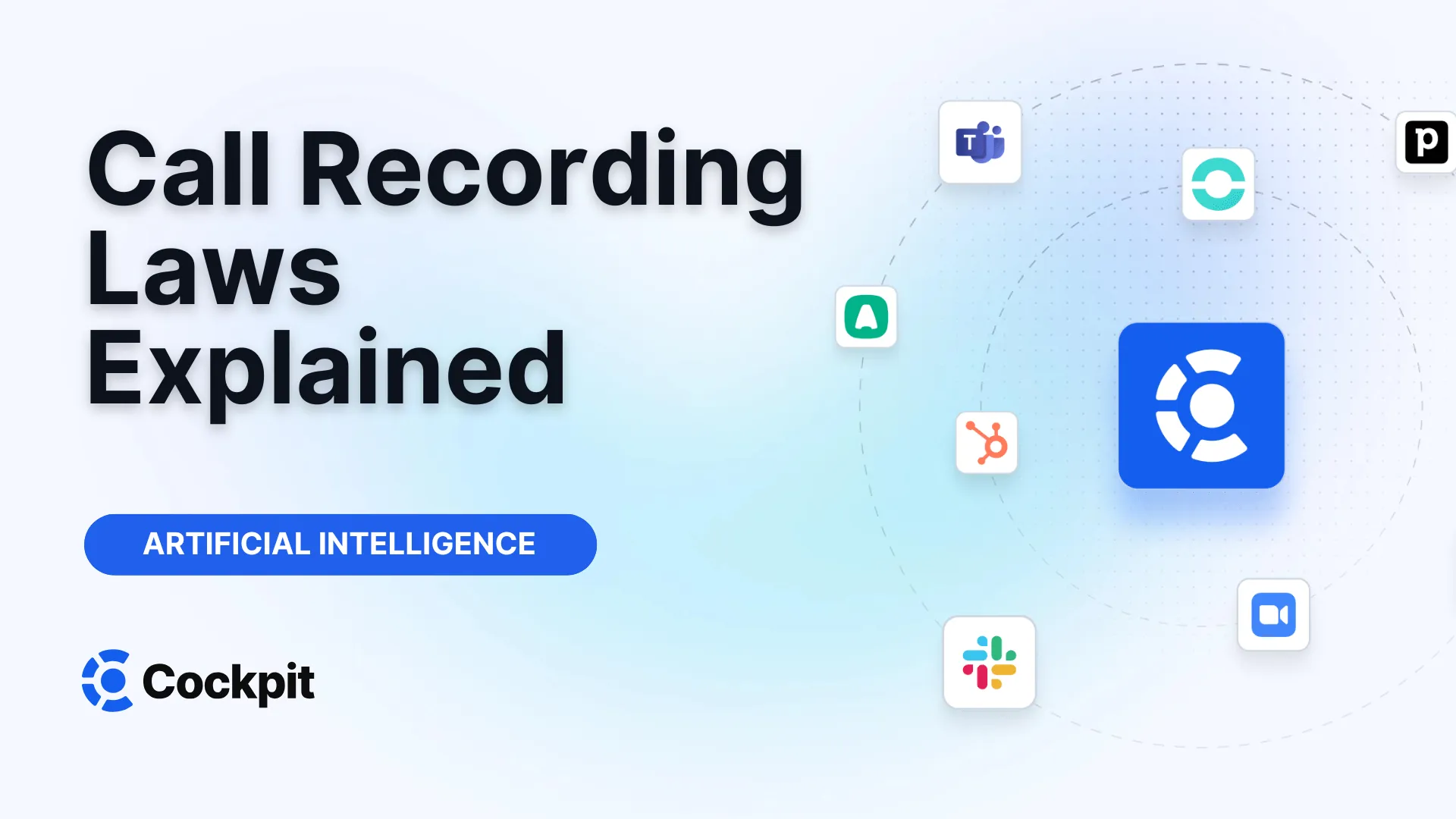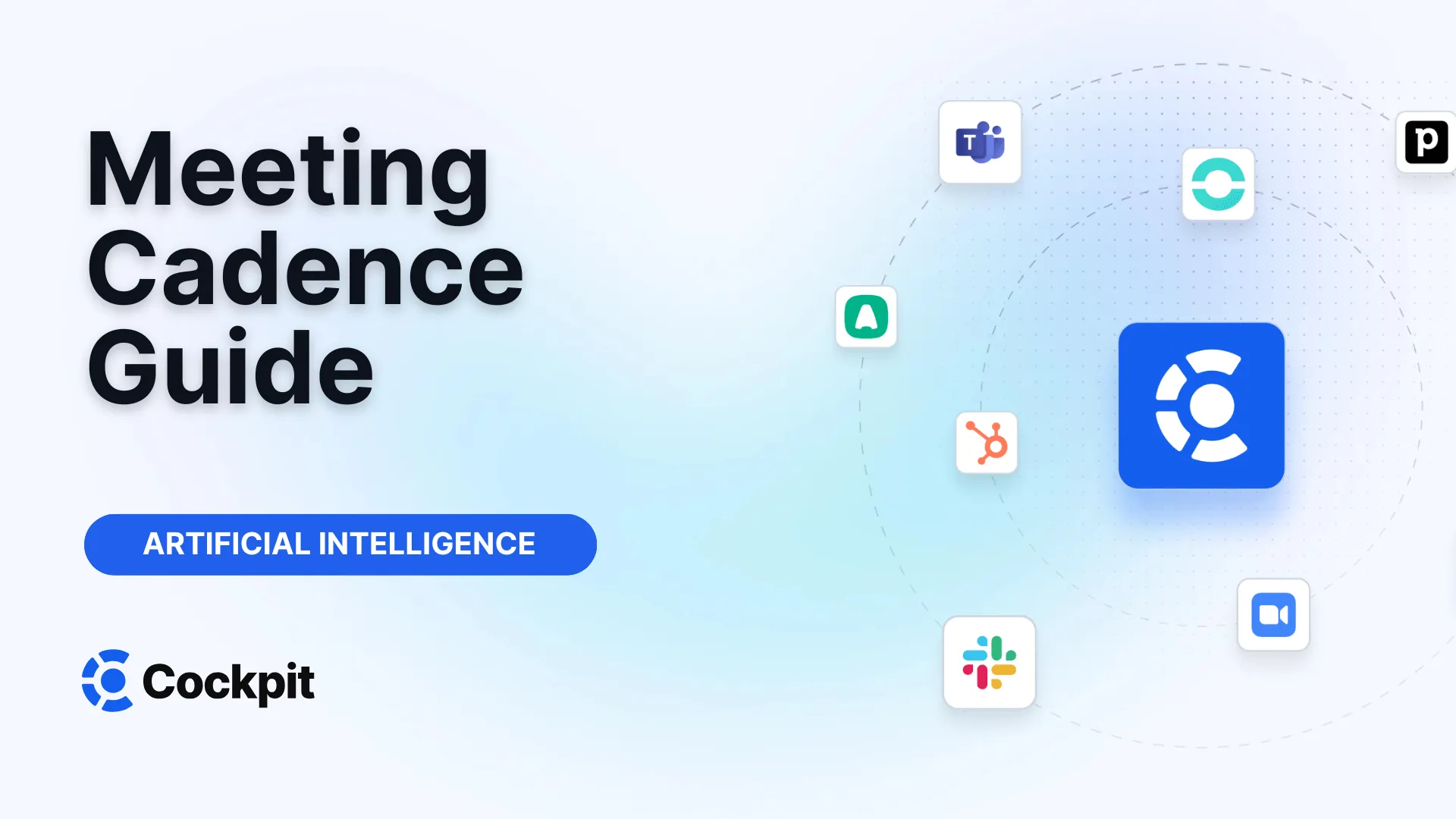Optimize your sales force in just a few clicks

Thousands of sales teams boost their performance with Cockpit. Why shouldn't you?
Explore CockpitSummary
Have you ever wanted to record an important phone call so you wouldn't forget anything? Or perhaps you wished to keep a record of your virtual meetings to refer back to later? This practice is becoming increasingly common, but a crucial question often arises at the last moment: is it legal? Recording a conversation without permission may seem harmless, but the laws governing it are complex and vary greatly from place to place. Navigating this legal labyrinth can be intimidating, and an error, even unintentional, can have serious consequences.
This guide aims to demystify the rules surrounding recording calls and meetings. We will explore the different types of consent, detail the specific laws in each U.S. state, and cover legal implications to help you understand your rights and act in full compliance.
Fundamentals: One-Party vs. Two-Party Consent
Before delving into geographic specifics, it is essential to understand the two main principles governing the recording of conversations: single-party consent and all-party consent. Nearly all laws, both federally and at the state level, are based on one of these two approaches.
The U.S. federal law, the Electronic Communications Privacy Act (ECPA), establishes a basis of one-party consent. This means it is legal to record a conversation as long as at least one person involved has given consent. This person can be yourself. Thus, under federal law, you can record a conversation in which you are a participant without needing other parties’ permission. The majority of U.S. states follow this same approach.
All-party consent (often called "two-party consent") is a stricter rule. In states that apply it, you must obtain the permission of each person involved in the conversation before pressing the record button. Failure to do so constitutes a violation of the law. This approach aims to more rigorously protect the privacy of all participants.
Active or Passive Consent?
Consent does not always need to be a verbal "yes." It can be active or passive (implicit).
- Active consent is explicit. This occurs when you directly ask, "May I record this call?" and the other person agrees, or when a participant clicks on an “I agree” button in a recording notification.
- Passive (or implicit) consent is subtler. It is considered obtained when participants are clearly informed that the conversation is being recorded and choose to continue the exchange. The classic message “This call may be recorded for quality and training purposes” is a perfect example. By staying on the line, the participant gives implicit consent.
Federal law [18 U.S. Code Section 2511] prohibits the intentional interception of communications but provides a crucial exception if one of the parties has given prior consent. However, this exception does not apply if the recording is made with the intent to commit a criminal or unlawful act.
Call Recording Laws: A State-by-State Overview
This is where things get complicated. Although federal law is one-party consent, each state has the authority to adopt stricter laws. It is therefore imperative to know the rules of the state where you (and your interlocutors) are located. Recording a call without the required permission can expose you to criminal and civil prosecution.
One-Party Consent States
In these 37 states and the District of Columbia, you can legally record a conversation if you are a participant, without informing the other parties.
- Alabama
- Alaska
- Arizona
- Arkansas
- Colorado
- District of Columbia (D.C.)
- Georgia
- Hawaii
- Idaho
- Indiana
- Iowa
- Kansas
- Kentucky
- Louisiana
- Maine
- Minnesota
- Mississippi
- Missouri
- Nebraska
- Nevada (for in-person conversations)
- New Jersey
- New Mexico
- New York
- North Carolina
- North Dakota
- Ohio
- Oklahoma
- Rhode Island
- South Carolina
- South Dakota
- Tennessee
- Texas
- Utah
- Vermont (no clear law, so federal law applies by default)
- Virginia
- West Virginia
- Wisconsin
- Wyoming
All-Party Consent States
These states require that all persons involved in the conversation give their consent to the recording.
- California
- Delaware
- Florida
- Illinois
- Maryland
- Massachusetts
- Michigan (technically, but with important nuances)
- Montana (requires all parties' “knowledge”)
- New Hampshire
- Pennsylvania
- Washington
Special Cases and “Mixed” Laws
| State | Specific Rule |
|---|---|
| Connecticut | All-party consent for phone calls and electronic communications, but one-party consent for in-person conversations. |
| Oregon | One-party consent for phone calls and electronic communications, but all-party consent for in-person conversations. |
| Nevada | One-party consent for in-person conversations, but all-party consent for phone calls and text messages. |
| Michigan | Although the law mentions all-party consent, courts have interpreted that it does not apply to a participant in the conversation, effectively making it a one-party consent state for participants. The situation remains legally ambiguous. |
| Illinois | Requires all parties' consent for recording any "private conversation," whether in person or by phone. The notion of "private conversation" is key and depends on reasonable expectations of privacy. |
Warning: Interstate Calls
What happens if you are in a one-party consent state (like Texas) and call someone in California, an all-party consent state? Courts are not unanimous regarding which law applies. To avoid legal risk, the golden rule is always to comply with the strictest law. In this example, you should obtain consent from all parties.
What Are the Consequences of Illegal Recording?
Ignoring laws on recording conversations is no trivial matter. Recording a call without proper permission can lead to severe penalties that vary by state but are almost always serious.
On the criminal side, consequences may include:
- Hefty fines: These can range from a few hundred to several thousand dollars.
- Imprisonment: Depending on the severity of the offense and the state, a violation can be classified as a misdemeanor or a felony. Prison terms may vary from a few days to several years. For example, in Florida or Pennsylvania, illegal recording can be a third-degree felony punishable by multiple years in prison.
On the civil side, the victim of illegal recording may sue you to obtain:
- Damages: The person recorded without consent can claim financial compensation for the violation of their privacy.
- Punitive damages: In some cases, courts may grant additional damages to punish the offender and deter future violations.
- Attorney’s fees reimbursement: You could be ordered to pay the plaintiff’s legal costs.
Furthermore, a recording obtained illegally will almost certainly be deemed inadmissible as evidence in court, rendering it useless for legal purposes.
How to Record Your Conversations Legally?
The key is transparency. Whether you are in a one-party or all-party consent state, the best practice is always to inform all participants that the conversation is about to be recorded. This removes ambiguity and builds trust.
Obtaining Clear and Explicit Consent
Here are some simple ways to ensure compliance:
- Verbal announcement: Start the call or meeting by simply saying: “Hello, I am letting you know that I am recording this conversation for follow-up purposes. Do you agree?”
- Visual notification: For virtual meetings, platforms like Zoom or Google Meet display a clear notification and often a blinking red dot visible to all participants.
- Warning in the invitation: Include a note in the calendar invitation, for example: “Please note this meeting will be recorded to be shared with participants.”
- Audible beep tone: Some laws, notably in California, mention using an audible beep at regular intervals as a notification method.
Using the Right Tools to Ensure Compliance
Technology can be your greatest ally in staying compliant without complicating your processes. Conversational intelligence platforms like ours are designed to integrate natively into a legally compliant workflow.
At Cockpit, we understand that compliance is non-negotiable. Our meeting assistant is designed to operate transparently. When our bot joins a call to record it, it is clearly identified (for example, as "Cockpit Assistant") in the participant list. This acts as a passive notification, signaling that recording is in progress. You are thus freed from manual note-taking and CRM data entry post-call, while knowing that the process is transparent. By automating transcription, summary, and data synchronization to your CRM, we enable you to fully focus on the conversation, confident in a reliable and ethically obtained record.
Expert Tips
Even if you operate from a one-party consent state, we recommend always notifying all participants. Adopting an all-party consent policy as an internal standard simplifies your processes, eliminates risks related to interstate calls, and builds trust with your clients and partners. Transparency is always the best strategy.
Beyond the United States: An Overview of International Laws
If your business is international, it is crucial to know the rules in other countries. Privacy protection laws there are often even stricter.
European Union (GDPR)
The General Data Protection Regulation (GDPR) governs data protection for all EU citizens. To record a call with an EU resident, you must:
- Obtain clear and unambiguous consent from all parties.
- Have a legal basis justifying the recording (for example, contract performance, legal obligation, or a legitimate interest that does not override individual rights).
- Inform participants of the purpose of the recording, data retention period, and their rights (access, correction, erasure).
United Kingdom, Canada, and Australia
- United Kingdom: UK law (UK-GDPR and Data Protection Act 2018) is very similar to the EU GDPR. Consent of all parties and a legal basis are required.
- Canada: The Canadian law (PIPEDA) requires consent from all parties. You must inform people of the recording, its purpose, and obtain their agreement.
- Australia: The general rule is consent of all parties, although some territories like Queensland allow one-party consent. It is safer to always obtain all parties' consent.
Navigating the legal landscape of call recording may seem complex, but the basic principles are transparency and respect. By knowing the laws that apply to you and adopting clear consent practices, you can harness the power of recordings to improve your productivity and performance without ever crossing legal boundaries. Tools like ours are designed to accompany you in this endeavor by automating tedious tasks while fostering a transparent and compliant working environment.
Frequently Asked Questions (FAQ)
What is "implicit" or "passive" consent?
Implicit consent occurs when a person, after being clearly informed that a call is being recorded, chooses to continue the conversation. Not hanging up after hearing a warning message (“This call is being recorded…”) is generally considered passive consent. However, its legal validity may be weaker than active and explicit consent, especially in jurisdictions requiring all-party consent.
What should I do if I believe one of my calls has been recorded without my permission?
If you suspect illegal recording, the first step is to gather all possible evidence (dates, times, content of the conversation). You can then consult a privacy law attorney to assess your options. These may include filing a complaint with the appropriate authorities or initiating a civil lawsuit to seek damages. Do not act alone, as these matters are legally complex.
Do laws apply differently to professional and personal calls?
Generally, consent laws apply to all conversations where there is a “reasonable expectation of privacy,” whether personal or professional. However, some exceptions may exist. For example, conversations in public places where privacy cannot reasonably be expected are usually not protected by these laws. In a professional context, employers may have specific policies regarding call recording on company lines but typically must inform their employees.
How does a tool like Cockpit help ensure compliance?
Our platform is designed for transparency. Instead of recording secretly, our meeting assistant appears as a full participant in your video call, clearly notifying all parties of its presence. We encourage combining this tool with a verbal announcement or a note in your invitation for maximum compliance. By automating visible capture of information, we help you create a reliable record of your exchanges while respecting an ethical framework and fostering trust, allowing you to focus on what matters most: the conversation itself.




